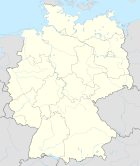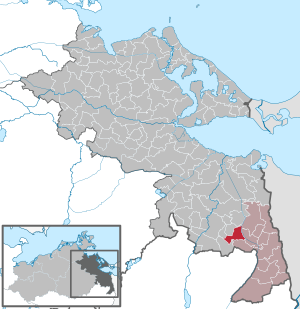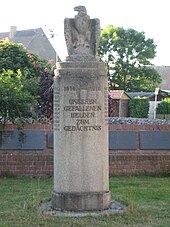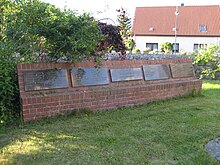Rossow
| coat of arms | Germany map | |
|---|---|---|

|
Coordinates: 53 ° 28 ' N , 14 ° 8' E |
|
| Basic data | ||
| State : | Mecklenburg-Western Pomerania | |
| County : | Vorpommern-Greifswald | |
| Office : | Löcknitz-Penkun | |
| Height : | 35 m above sea level NHN | |
| Area : | 23.09 km 2 | |
| Residents: | 427 (Dec. 31, 2019) | |
| Population density : | 18 inhabitants per km 2 | |
| Postal code : | 17322 | |
| Area code : | 039754 | |
| License plate : | VG, ANK, GW, PW, SBG, UEM, WLG | |
| Community key : | 13 0 75 117 | |
| Office administration address: | Chausseestraße 30 17321 Löcknitz |
|
| Website : | ||
| Mayor : | Edmund Gebner | |
| Location of the community of Rossow in the Vorpommern-Greifswald district | ||
Rossow is a municipality in the district of Vorpommern-Greifswald in eastern Mecklenburg-Western Pomerania (Germany). The community belongs to the office Löcknitz-Penkun with seat in the neighboring community Löcknitz .
geography
The community is located on the western edge of the Randowbruch between the town of Pasewalk and Löcknitz. The Polish border in the east is 16 kilometers away. The extensive flatland area of the Ueckermünder Heide begins north of Rossow, while an end moraine arch runs along the Randowtal to the south .
Rossow is surrounded by the neighboring communities of Zerrenthin in the north, Rothenklempenow in the northeast, Löcknitz in the east, Bergholz in the south, Fahrenwalde and Polzow in the west.
Community structure
|
|
- Incorporations
- Wetzenow was incorporated into Rossow as a district in 1965.
history
Name and Early History
The place name Rossow is probably derived from the Slavic name for " moisture " or " dew ". Rossow was already inhabited by Slavs, who settled in the area in the 7th and 8th centuries , even before the medieval German settlement in the east .
The spelling of the place name Rossow remained relatively constant over the centuries, if one compares the sparse documents and name entries on maps:
|
|
middle Ages
Rossow was officially mentioned for the first time indirectly in a document on November 10, 1314. In this, the two noble landlords " Huve de Rossow " and " Iohannes de Rossow " appeared as witnesses to a purchase contract concluded in Pasewalk . Both in Pomerania there was a noble family called " Rossau ", which died out before 1648, and in the Rhineland with the name " Rossaw ". Already in 1316 Rossow changed hands together with the place Battin near Brüssow and was sold by the landlord to the diocese of Cammin , which annexed both villages as goods to the castle Löcknitz , which was also a table good of the bishop of Cammin . In this way, Rossow shared the further fate of the castle and village of Löcknitz in the next few centuries and was now also in an exposed location on the border between Pomerania and Brandenburg and was constantly contested between the two territorial states . The old noble families of those von Eickstedt , von Buch and von der Huffe had extensive estates in and around Rossow, whereby the latter noble family took their knightly seat in Rossow in 1314 and had a mill and a jug built.
After the death of Duke Otto III. from Pomerania-Stettin and the outbreak of the Stettin succession dispute, war broke out again between Pomerania and Brandenburg. As a result, Rossow was conquered by the Electorate of Brandenburg in 1468 . In 1471 the Elector of Brandenburg appointed the Brandenburg nobleman Hans von Buch from the Uckermark as the new castle captain of Löcknitz Castle and official of the Löcknitz office, who was also responsible for Rossow. Hans von Buch's successors were at short intervals Gottfried von Hohenlohe and from 1472 Werner von der Schulenburg . During a counter-attack by Duke Bogislaw X, the great of Pomerania, on the Uckermark in 1477, Rossow could also be briefly recaptured from Pomerania in April 1478. After the incursion of a Brandenburg army under Elector Albrecht III in 1479 . Achilles of Brandenburg in Pomerania and through the mediation of Werner von der Schulenburg, however, the Prenzlau contract could be negotiated in the same year , in which Brandenburg, among other things, also received the village Rossow again after 1472 and this time finally confirmed by Pomerania and this from then on now belonged to the Mark Brandenburg in the Uckermark and was part of the castle and the office of Löcknitz. After Elector Albrecht III. Achilles von Brandenburg also enfeoffed Werner von der Schulenburg in 1479 as a reward for his mediation of the peace treaty with the hereditary captaincy over the castle Löcknitz and appointed him as bailiff of the office Löcknitz, the latter expanded his property considerably in the next few years and acquired it on August 8th. December 1492 among other things also the then about 56 Hufen village Rossow.
Modern times
After 1570 the von Eickstedts managed the former von Huffesche Rittergut and Dorf Rossow from their headquarters in Rothenklempenow . At this point in time the rights of the peasants and cottagers in Rossow had been gradually restricted and partially abolished since 1543. Rossow was also affected by the so-called “beer war” between Pasewalk and Prenzlau in the second half of the 16th century, which was triggered by inconsistent standard measurements and the levying of an excise in the form of a beer tax by the Brandenburg Elector. Because his Dorfschulze (mayor) was also Krüger , i.e. innkeeper , and until then had the sole right to drink beer . In 1564 it was therefore stipulated for Rossow that not only the Kruger, but also the aldermen of the place received a notch stick to measure the standard.
During the Thirty Years' War from 1618 to 1648 Brandenburg and the Uckermark were occupied, plundered and devastated several times by the various warring parties, something which Rossow was not spared. So in 1633 Swedish mercenary troops camped in the village, plundered Rossow, which was one of the richer villages in the district of Löcknitz, and also demanded war contributions. After the end of the war and the conclusion of peace in 1648, however, the situation hardly changed. The contributions that the Elector of Brandenburg now raised were retained, and the economy too only slowly got going again. After the mill in Rossow went back into operation in 1653 and some new shepherds had opened in the village, in 1657 a total of 19 shepherds from the Uckermark and the Stolpirischen Kreis, including Rossow, turned to the knighthood and the estates of the Electorate of Brandenburg To achieve freedom of contribution for 200 sheep and a reduction in compulsory labor, but this was rejected. As a result, in April 1660 in Rossow there were first disputes between the farmers and shepherds of the village and the visitation commissions sent by the Elector to assess the livestock for tax purposes. Only through the threat of violence and imprisonment, with which the electoral administrator of the heavily indebted Schulburg possessions, Vollrath von Maltzahn, in particular, was able to calm down the situation again. However, as early as 1683 to 1685, the villages of the Löcknitz estate, including Rossow, went on labor strike, whereupon only the electoral administrator was relieved of his office, but nothing else changed. In 1687, the farmers complained again because of the poor conditions.
Even after the end of the Thirty Years' War, Brandenburg-Prussia had only recovered extremely slowly and only partially from the devastation and destruction caused by the effects of the war. Elector Friedrich Wilhelm therefore continued his policy of peuplication , which had already begun between 1648 and 1650 , and in 1685 issued the Edict of Potsdam , which not only allowed religious refugees from Switzerland , the Palatinate , Wallonia and the Netherlands , but also the Protestant Christians persecuted in France , the Huguenots ( Réfugiés), offered free and secure settlement in Brandenburg-Prussia and granted them extensive rights and privileges. Of the 50,000 Huguenots who fled to the Holy Roman Empire , about 20,000 Huguenots with their diverse, highly qualified skills and professions settled in Brandenburg-Prussia. About 2,000 Huguenots came to the Uckermark in particular, bringing with them the cultivation of tobacco and silkworms . These were mainly settled there in 42 localities as arable farmers and tobacco growers in order to rebuild the economy and the devastated land, including in the Löcknitz district. There, until 1697, around 100 Huguenot families settled in ten official villages, including Battin and Bagemühl (today both districts of Brüssow ) and in Fahrenwalde, Bergholz, Rossow and Zerrenthin, French reformed parishes of these colonists. The Huguenots, who settled in Rossow, were able to create a relatively good economic basis for themselves with tobacco cultivation as early as 1690, but only received permission to use the Lutheran Church in Rossow for their church services and to use the Lutheran Church in Rossow for their services only in 1699, after the intervention of the French Upper Consistory in Berlin to hold their own school lessons. The different religious interpretations and the economic success also harbored conflict material in the village, so that some Huguenots left Rossow again after 1720 and settled again in nearby Pasewalk. Rossow still belonged as a village to the office of Löcknitz as part of the Uckermark to the Mark Brandenburg in the Electorate of Brandenburg-Prussia and as a Vorwerk to Löcknitz Castle, although this had already been converted by the elector from a private estate into a separate electoral domain in 1685.
During the Great Northern War from 1700 to 1721, especially from 1711 to 1715 and during the Pomeranian campaign of 1715/16, Russian, Prussian and Saxon troops crossed the Uckermark and the area in and around Rossow in the fight against Sweden and to conquer Swedish Pomerania. As a result of this and the outbreak of the plague in Prenzlau in 1710, the area and its inhabitants were devastated by new ones and plagued by destruction. Not only was the thoroughfare from Pasewalk via Rossow to Stettin closed, but the village also suffered from requisitions and, in particular, in 1718 from recruitment and forced squeezing of residents into soldiers by the troops passing through. By the year 1746, the situation in Rossow had already improved significantly, so that a Prussian Chamber Council, who was on a visitation trip and made a stopover in Rossow, noted the meadows and herding, tobacco and potato cultivation and cattle breeding would have a good status in Rossow. When Rossow visited again in 1749, the village had the best potato yields in the entire Löcknitz district.
Even during the Seven Years' War from 1756 to 1763, Rossow was not spared from acts of war and had to cope with severe material and economic damage from the Prussian and Swedish troops passing through and fighting each other. In today's Rossow district of Wetzenow , a battle between Prussian and Swedish troops took place at the beginning of October 1760. The damage caused by the war was still clearly visible in both Rossow and Wetzenow in 1764. The living conditions of the inhabitants were also extremely bad during these times. It is known for Rossow that in 1769 two families had to share a room and a chamber. After the Vorwerk and the village of Rossow had been part of the electoral domain of Löcknitz, it was initially leased and later given as a separate long-term lease. From 1774 Rossow was first owned by the Privy Councilor von Berg, from 1803 it belonged to Isaac Barth and in 1816 to Mr. Sitlar, in 1836 it passed to the widow Bettac and in 1840 belonged to the landowner Kersten.
Latest time
After the end of the coalition and Napoleonic wars from 1792 to 1815, a fundamental administrative reform was carried out in the Kingdom of Prussia in 1818 , with the reorganization of the provinces, administrative districts and counties. In connection with this, Rossow's centuries-long affiliation with Löcknitz Castle was finally dissolved and the place was also spun off from the Löcknitz office. While Loecknitz the Prussian province of Pomerania came back Rossow now belonged from 1818 to 1950 for the district of Prenzlau in the administrative district of Potsdam and thus remained in the Prussian province of Brandenburg . 1820 was Chaussee Pasewalk-Loecknitz-Stettin built, which also Rossow has now much better connected with ordinary roads to the transport network. With the construction of the Löcknitz- Brüssow- Prenzlau road in 1878/79, Rossow was once again much better connected to Brandenburg and the Uckermark via Löcknitz. As early as November 1862, Rossow was indirectly connected to the Prussian railway network by the Berlin-Stettiner Eisenbahn-Gesellschaft , although initially there were only stations in Pasewalk, Löcknitz and Grambow. In March 1863 the Pasewalk-Löcknitz-Stettin railway lines were officially opened. Rossow only got its own small train station much later when the line was expanded to two tracks.
A decisive event for Rossow was the great village fire of January 14, 1878, in which parts of the village were destroyed and 26 families were left homeless, 16 of them family workers. Rapid help was organized by the mayor Bettac and the Rossower community leader Giese as well as the community church council, among other things through calls for help in the newspaper.
In 1915 a new schoolhouse was built in Rossow. The specialty was that for religious reasons it was built as two single-class elementary schools (!). Because the children of the French Reformed community, as descendants of the Huguenots who had formerly settled in Rossow, received their own school lessons there until 1923 in their own class and their own elementary school, separate from the Evangelical Lutheran students who also had their own one-class Elementary school formed. In total, 71 pupils in Rossow were at times taught in just one class or even 130 pupils were taught by just one teacher. In the still standing “old school house” a “ historical school room” opened in 1987 as a small museum is now housed, among other things with exhibits on the history and development of school conditions.
In 1903 the " Patriotic Warrior Association Rossow " was founded in the village , which looked after the graves of soldiers from Rossow who were killed in particular in the German Wars of Unification of 1864, 1866 and 1870/71. 21 soldiers from Rossow were also killed in World War I. In their honor, a war memorial was erected which is now in the churchyard of the village church Rossow . A volunteer fire brigade was and is also in Rossow, the exact date of its establishment is unknown, but it was officially recognized in 1925 as a "police auxiliary body". At times there were up to three gas stations in the village. During the Second World War , 52 residents from Rossow who fought as soldiers in the Wehrmacht were killed. A memorial stone with the names of these fallen soldiers was erected in the 1990s behind the war memorial of the fallen soldiers from the First World War.
With the GDR district reform in 1950 , Rossow was added to the newly formed ( Western Pomerania ) Pasewalk district in the state of Mecklenburg . Due to the dissolution of the federal states and the formation of the districts in the GDR in July 1952 , Rossow and the Pasewalk district were part of the Neubrandenburg district until 1990 . Until 1948, the Soviet Military Administration in Germany (SMAD) with a land reform in the Soviet Occupation Zone (SBZ) expropriated land from large landowners , divided it up and redistributed it to farmers or displaced persons. In Rossow, 360 hectares of land were expropriated and redistributed. In 1954 the first LPG was founded in Rossow, which was converted into a LPG type III with 54 members by 1957 and comprised 821 hectares of land. In 1960 there was already an LPG type III (136 members, 1231 hectares of land) and an LPG type I (28 members, 149 hectares of land) in Rossow, which both merged to form an LPG in 1969 and was expanded again in 1974 through the merger with the LPGen in Zerrenthin and Polzow . In 1965 Wetzenow was incorporated as a district after Rossow.
In 1990, with German reunification, the state of Mecklenburg-Western Pomerania was rebuilt for the second time after 1945. As a result of the Mecklenburg-Western Pomerania district reform in 1994 , the new district of Uecker-Randow was formed from the three GDR districts Pasewalk , Ueckermünde and Strasburg , to which Rossow belonged until 2011. From 1994, Rossow belonged again to the Löcknitz office, which was also created again, and then to the Löcknitz-Penkun office from 2004 . As a result of the Mecklenburg-Western Pomerania regional reform in 2011 , Rossow belongs to the newly formed district of Western Pomerania-Greifswald .
700th anniversary in 2014
The 700th anniversary of Rossow on the occasion of its first documentary mention in 1314 was celebrated with various events on August 15 and 16, 2014. While the celebration was opened on the evening of August 15 with a festive service, the main item on the program took place on August 16 with a one-and-a-half hour historical pageant on the B 104 through the entire town, with depictions, pictures, costumes and vehicles on the history of Rossow, in which numerous residents from Rossow but also from the surrounding communities took part as amateur actors. In addition to various cultural-musical events that took place throughout the day and into the night in the marquee on the Rossower sports field, u. a. also minted commemorative coins and presented an exhibition on local history in the community room
Population development
Following the general trend in Western Pomerania, the number of inhabitants in Rossow also fell steadily after 1990.
|
|
|
politics
mayor
- around 1878 mayor Giese
- GDR period - June 2004 Manfred Döbler (* 1938 † 2009)
- since July 2004 Edmund Gebner
Coat of arms, flag, official seal
The municipality has no officially approved national emblem, neither a coat of arms nor a flag . The official seal is the small state seal with the coat of arms of the region of Western Pomerania . It shows an upright griffin with a raised tail and the inscription "GEMEINDE ROSSOW * LANDKREIS VORPOMMERN-GREIFSWALD".
Culture and sights
Attractions
- The village church Rossow is an early Gothic stone church from the 13th century, which was built from neatly layered granite ashlars, with a recessed rectangular choir and a church tower with a square half-timbered tower as well as another significantly smaller, octagonal upper floor with a pointed helmet .
- Farms in Rossow
- " Historical school room " - the first exhibits were brought together in 1985. In 1987 the small museum was opened in the old school house in Rossow. It shows the development and history of school conditions and is equipped with the inventory of a one-class village school. In addition to old curricula and certificates, you can also find a catheter, lectern and cane. The school museum is directed by Werner Mutz, a retired teacher and the last director of the Rossow village school before it closed.
societies
- Schalmeienkapelle-Rossow eV
- → Founded in 1960 by twelve comrades from the Rossow volunteer fire brigade and spun off as a separate association as early as 1965. In 1987, the Schalmeienkapelle founded the "Minstrels Section" in the BSG "Traktor" Rossow and from 1987 to 1990 they took part in four district championships in the three northern districts of the GDR (Rostock, Schwerin, Neubrandenburg). In 1987 they became district champions in the shawm genre. Walter Tobi (1960), Michael Wagner (1960–1985), Ralf-Peter Nadler (1985–2015) and Stefan Nadler (since 2015) have directed the Schalmeienkapelle Rossow since it was founded.
- SC Eintracht Rossow eV
- Rossower Carnival Club (RKK)
Events
Important and regularly held events in Rossow are the " Rossower Music Festival ", which takes place on the sports field for the first time in 1997 and since 2000 every two years on the second weekend in June , which is very well known and extremely popular not only regionally but also nationally attracts numerous guests and visitors from the surrounding cities and communities. During the music festival, which opens with a parade through the entire village on Bundesstraße 104 , not only the Rossower Schalmeienkapelle performs, but also several other Schalmeienkapelle from all over Germany as well as other music groups. Furthermore, the " Rossower Harvest Festival " takes place every year either in September or October.
The place has already been used for right-wing extremist concerts by the local neo-Nazi scene.
Transport links
The Federal Highway 104 leads from Lübeck over Schwerin and Neubrandenburg including by Rossow and further via the border crossing in the left approximately 31 kilometers away Szczecin (Szczecin) in Poland . In addition, Rossow has connections to the federal motorway 20 with the Pasewalk-Nord and Pasewalk-Süd junctions 18 and 15 kilometers away .
Rossow also has a connection to the UER-26 district road , which bears the name Bergholzer Damm and which connects the place with the municipality of Bergholz , four kilometers away .
A good two kilometers north of Rossow, the Bützow – Szczecin railway runs past the place, on which Deutsche Bahn DB class 628 diesel multiple units run in both directions every 2 hours from Lübeck to Stettin . Rossow and the station building that still stands there today have not been an official stop for regional trains since 1994.
literature
- Lieselott Enders : Historical local lexicon for Brandenburg, Part VIII, Uckermark , Weimar 1986, ISBN 3-7400-0042-2
- Johannes Schultze (ed.): Das Landbuch der Mark Brandenburg from 1375 , publication of the historical commission for the province of Brandenburg and the imperial capital Berlin, VIII, 2, Berlin 1940
Web links
Individual evidence
- ↑ Statistisches Amt MV - population status of the districts, offices and municipalities 2019 (XLS file) (official population figures in the update of the 2011 census) ( help ).
- ↑ a b c d e f g Official notice of the office of Löcknitz-Penkun, Volume 9, No. 04, April 8, 2014, pp. 12-14. (PDF; 7.66 MB)
- ↑ a b c d e f Official Bulletin of the Office Löcknitz-Penkun, Volume 9, No. 05, May 20, 2014, pp. 19-20. (PDF; 6.46 MB)
- ↑ a b Fred Lucius: This is how the Rossower lived 100 years ago. In: Pasewalker Zeitung. June 10, 2014, p. 20.
- ↑ a b Löcknitz-Penkun office. Rossow community.
- ↑ a b c d e f g h i j k l m n Historical local dictionary for Brandenburg, Part VIII: Uckermark, Volume 2: MZ, Weimar 1986, p. 834 ff.
- ↑ Festival program "700 Years of Rossow"
- ↑ Gabriele Heyden: Quaint: This is how a village celebrates its 700th birthday !. In: Pasewalker Zeitung. August 18, 2014, p. 16. Online: Nordkurier Online from August 17, 2014 , accessed on August 19, 2014.
- ↑ Municipal directory Germany 1900. Prenzlau district.
- ^ A b Michael Rademacher: German administrative history from the unification of the empire in 1871 to the reunification in 1990. Prenzlau district. (Online material for the dissertation, Osnabrück 2006).
- ↑ Official notice of the office Löcknitz-Penkun, year 9, no.05, May 20, 2014, p. 20. (PDF; 6.46 MB)
- ↑ a b c d e Population on December 31. according to communities and districts. (No longer available online.) In: SIS-Online - Statistisches Informationssystem. Statistical Office MV, archived from the original on December 26, 2017 ; Retrieved December 25, 2017 . Info: The archive link was inserted automatically and has not yet been checked. Please check the original and archive link according to the instructions and then remove this notice.
- ↑ Main Statute, Section 1, Paragraph 2 (PDF).
- ↑ Schalmeienkapelle-Rossow eV
- ↑ Archived copy ( Memento of the original from July 27, 2016 in the Internet Archive ) Info: The archive link was inserted automatically and has not yet been checked. Please check the original and archive link according to the instructions and then remove this notice.
- ↑ http://www.nordkurier.de/mecklenburg-vorpommern/jeden-zweiten-tag-eine-rechtsextreme-aktion-195784003.html
- ↑ https://sinnundwert.wordpress.com/2017/04/03/warum-die-npd-zu-unrecht-totgeredet-wird/








